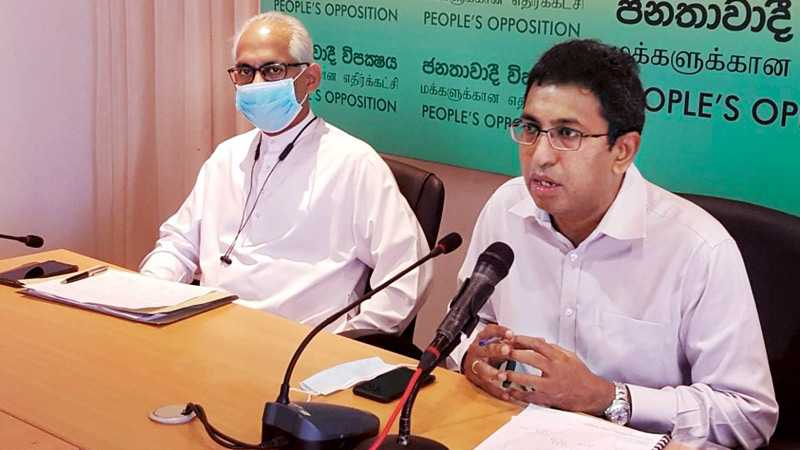Wednesday Feb 18, 2026
Wednesday Feb 18, 2026
Thursday, 5 November 2020 03:35 - - {{hitsCtrl.values.hits}}

SJB Parliamentarians Dr. Harsha de Silva and Eran Wickramaratne addressing the media yesterday
By Asiri Fernando
The Government must begin a dialogue with the International Monetary Fund (IMF) and international capital markets to re-profile the country’s debt repayments for the next year so they are postponed by 24 to 36 months, Samagi Jana Balawegaya (SJB) parliamentarian Dr. Harsha de Silva urged yesterday.
Speaking at a press conference at the Opposition leader’s office, Dr. de Silva called on the Government to understand the reality of the looming economic crisis and be mindful of nearly $ 6 billion in local and foreign debt repayment due in 2021.
He insisted it was imperative that the Government take early steps to engage with the IMF and other stakeholders to work out a practical solution and reduce impact on the public. SJB MP and former State Minister of Finance Eran Wickramaratne also attended the press briefing.
Dr. de Silva argued that the Government had failed to adapt to the COVID-19 crisis like many others and pointed out that ill-advised tax cuts early on at the start of the year had significantly reduced State revenue. That together with import restrictions and the COVID-19 impact had significantly increased revenue losses with the World Bank earlier this month projecting an 11% Budget deficit for this year.
“Because we are facing a new crisis thanks to COVID-19, we should try to reschedule repayments of loans and the interest. The Government must not be in denial, they have to take the right measures at the right time.
The impact can be managed, so that it doesn’t put too much pressure on the public.
“As a responsible Opposition we call on the Government to do that. The Government must begin an official dialogue with the IMF and with their advice seek to re-profile our repayments with a 24 or 36 month extension,” Dr. de Silva told reporters.
Dr. de Silva pointed out that the Government has already sought a debt restructuring arrangement from Indian Prime Minister Narendra Modi and already used one loan from the China Development Bank to help settle debts this year. “But the bulk of our loans are not from India or China, they are from international capital markets. So, we need to start that dialogue now.”
The former State Minister of National Policies and Economic Affairs questioned the accuracy of the Central Bank’s figures that predict a negative 1.7% growth in 2020 even though regional and international predictions were for a much larger contraction of 5% or more.
Dr. de Silva questioned the basis of the Central Bank’s prediction at a time when the Census and Statistics Department has delayed the release of second quarter growth numbers. Earlier this month the department said second and third quarter results will only be released in December due to technical issues.
“If you look at the reports from the Government Statistics Department on economic activity this year, you can clearly see a significant drop-in in major industries and SMEs. This means the economy has contracted already and it will probably be larger than what is predicted by the Central Bank,” Dr. de Silva argued. The former State Minister also appealed to the Government to be transparent and work to release data in a timely manner to make accurate predictions.
Citing a recent report from Barclays, Dr. de Silva said that larger amounts of State revenue will be needed to meet debt repayments next year, leaving little funds for recurrent and capital expenditure.
“About 70% of Government revenue will be needed to repay the interest of the loans Sri Lanka has taken. The Government introduced wide-ranging tax cuts early on and that had affected Government revenue significantly. The Government has failed to adapt to the new challenges they face.”
He also warned that import restrictions placed by the Government earlier this year are unsustainable as the economy will need to import to grow, moreover stopping imports such as vehicles will not be sustainable in the long term.
“We have to import. Because some of our exports are value added imports, re-exported. Stopping imports in the medium term is bad for business.”
SJB parliamentarian Eran Wickramaratne echoed his colleague’s views and recalled that the former Government had embarked on a fiscal consolidation mechanism to put Sri Lanka’s finances in a more sustainable footing. He also pointed out that Sri Lanka had its first primary and capital account surplus after many years under the previous administration.
